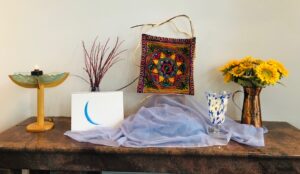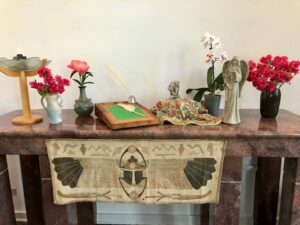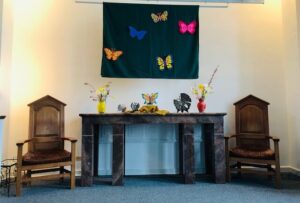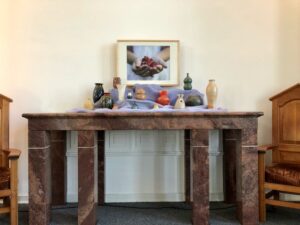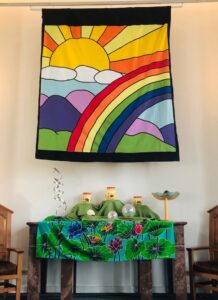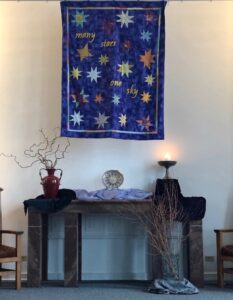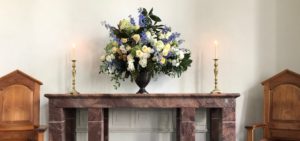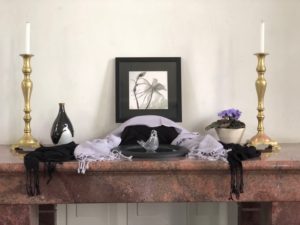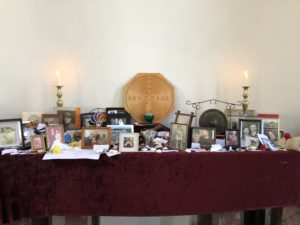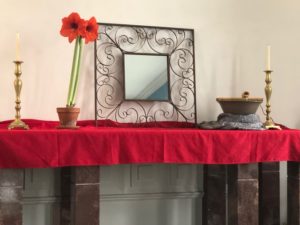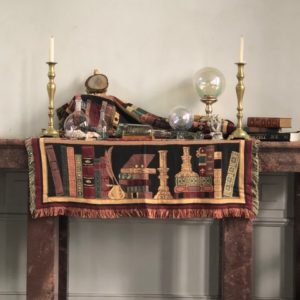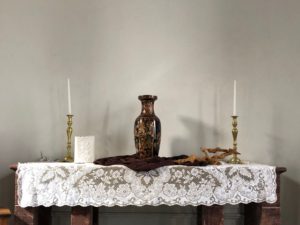The service was led by Rev. Karen Lewis Foley, retired UU minister from New England, now living in Charlottesville, and Bob Gross, Worship Weaver.
Opening Words: “The Rabbi’s Gift,” as told by William Houff in Infinity in Your Hand: in which an abbot of a monastery which has fallen on hard times with decreasing members and resources seeks the advice of his friend, a wise rabbi, who has no advice for him but tells him only one thing: “One among you is the messiah.” The abbot and monks, mystified, try to figure out who this could be, each ruminating on his own list of candidates, finding fault, of course, with each one. But they begin to treat each other with greater attention and respect because after all, you don’t want to alienate the messiah! Over time a change comes over the abbey, visitors notice a new atmosphere about the place, and more begin attending services. More men join the community—and I add my own emendation here—I’d like to think women did too! In time the abbey became a thriving community.
Sermon: Last Sunday I was struck by Erik’s blockbuster farewell sermon and Adam Slate’s reflection about God language, but also by other words. The sense of loss expressed by Alex, our assistant minister, and Karen Ransom, as well as their gratitude for the gifts Erik leaves with us. And Alex’s faith in this congregation: I hope you heard that.
We know we’re standing at the edge of a great change. Most of us have lived through great changes in our own lives. We know they’re scary, even welcome ones like college, a new job, marriage, a baby, retirement. The hard ones—the death of someone we love, losing a job, divorce—can overwhelm us. I’ve experienced all these changes and have learned three things about them. They can plunge us into the unfamiliar; we don’t know how to navigate our new reality. I hear that expressed here. We can even wonder who we are, or will become. Second, I’ve found that we do somehow go, or muddle, forward, and gradually find our footing in the new reality. And third, we ourselves are never the same again. The changes in our lives, whether chosen or thrust upon us, change us, for better or worse.
When Karen likened the church to a garden I got swept into her metaphor because, like her, I am a devoted gardener—one could say, addicted! I live with things emerging from soil, struggling into light, thirsting for water, consuming compost, thriving and blooming—or wilting and dying. Karen said that Erik has planted seeds here that will still grow and flourish. It occurs to me that it’s not alone what Erik planted here—he always called us “a community of ministers”—it’s what we’ve planted with him and will continue to plant. And it’s also how we cultivate what we plant. What will we choose to water? What will we choose to weed away?
Back when I grew vegetables—before I finally surrendered to the groundhog family who shared our yard—I ordered my vegetable seeds from a company called “Seeds of Change.” It sold exclusively organic, heirloom seeds in hope of contributing to a change in gardening methods to healthier and more environmentally responsible ones. Such a hopeful name: Seeds of Change! But gardening, watching seeds sprout and what they sprout grow, and what grows change profoundly, I understand this process as much deeper and more complex than “change.” Change is sort of like a swap. We change our clocks at daylight saving time. We change our clothes. In summer I change my morning routine, walk early when it’s cooler, attend to household tasks later. These are simple exchanges of one thing or one practice for another.
What happens to a seed, when it begins to produce a plant, is different: organic, gradual, and profound. The name of this sermon was going to be “Seeds of Change,” but I “changed” it: “Seeds of Transformation.” Because that’s what we undergo—if we pay attention and are intentional—when we live through a time of great change. Which is what I encourage us to do in our time ahead together.
Maybe you remember a toy from the eighties—my son had a few (maybe they still exist?): the Transformers. It would be an everyday object like a car or a radio, which, when you twisted this part and that part in prescribed ways, would become a scary robot. Twist all those parts back the other way and presto-changeo! You got your car or radio back. I never got how this thing qualified as a “Transformer!” The process was mechanical, linear, and always produced exactly the same result: the same car, the same robot, back to the same car. It changed, sure, but what happened wasn’t at all what I’ve experienced as transformation!
Not what happens in a seed, or an embryo, or a growing human soul. Not what happens in and to us when we encounter a wilderness to cross, a demand upon our best selves to make a new thing out of the unknown. Think of the times you’ve chosen a new path and found yourself perhaps exhilarated, but scared about where it might lead; or when you’ve fallen face first into unexpected, unwanted loss and forgotten for weeks or months—years—which way was up.
Eighteen years ago I made the same choice that Erik has just made. After eight years in my third parish ministry, an apparently successful solo ministry with a congregation I loved, I resigned—also in May, effective in August—suddenly and, to the congregation, completely unexpectedly. But I had been journeying the previous three years in discouragement and finally despair. The leadership had been moving away from the path they’d asked me to help them take when they’d called me—in which we’d made real and exciting progress. This often happens, but I didn’t know it then. I didn’t want to go backward and I saw they weren’t going to go any farther forward at that time. I was exhausted and dispirited.
I had not been in search for a new ministry so had no job to go to. They barely had time to find an interim minister. Neither the congregation nor I could know what lay ahead. They were in shock and I was in grief. I can’t vouch for how they moved through that time because of course I had to step away. But they have now been seventeen years with a successful minister and just celebrated the re-opening of their church after extensive remodeling, so they’ve thrived.
I knew of course what I would do: find a ministry with a congregation with a firmer sense of its identity. But when a colleague invited me to develop his large congregation’s pastoral care program, part-time, “for a year or two while you figure out your future,” I felt that undeniable “Yes” to which you just can’t say “No”—and over the next couple of years an unexpected vista opened up. In addition to loving that job, where I stayed four years, I enrolled in the Shalem Institute for Spiritual Formation’s spiritual direction program—the same one Erik completed about that time. Eventually I left parish ministry for what I came to call my “free-lance” community ministry of spiritual direction, retreats, workshops, and pastoral care trainings for congregations. It didn’t look anything like what I’d envisioned when I left a church a few years earlier. It’s been the favorite part of my thirty-plus years of ministry. I have to tell you, colleagues envied me! Now in retirement I continue to practice and love spiritual direction, and hope to do it until I can’t think straight.
Now I’m grateful that I was too tired and dispirited to do what everyone counseled me to do—jump back in the saddle. Staying with the questions my experience raised, I reflected, sought counsel, and noticed where I felt called. What was trying to grow had a chance to grow.
You know the story of Jacob, in Genesis? He cheated his older brother, Esau, of his birthright and of their father’s blessing meant for the eldest son. That was very important to those folks back then. He fled to a faraway country where he fell in love with Rachel, worked seven years for her father to earn the right to marry her, but was tricked into marrying her less attractive sister Leah, then worked another seven years to earn Rachel, and bred his father-in-law’s sheep in a clever way to wind up owning most of the offspring. Finally, wealthy, with two wives, two concubines and a batch of children, he returned to his home country. Where—ulp—he heard his brother Esau was coming to “greet” him. Esau, who had every reason to hate him, might even kill him. He spent the night alone, away from his caravan, anxious, mulling over the possibilities and dangers. Maybe he even prayed.
There came to him “a man,” the story goes, who wrestled with him all night until daybreak. Jacob does not give in; he stays in the struggle—the struggle with what this “man” represents, the need to confront what in himself has brought him to this pass. We are dealing here with an obvious psychological metaphor, a spiritual metaphor. At daybreak the man/angel, unable to beat Jacob, touches his hip socket, giving Jacob a limp for the rest of his life. Then he tells Jacob, “It’s getting light—let me go!” But Jacob, staying in the struggle, says, no, not until you give me your blessing! The angel instead asks his name, Jacob—“Usurper,”—and gives him a new one: Israel. He who has struggled with God and men and prevailed. Progenitor of a people. Only then does he bless him.
The next day he and Esau meet with welcome from Esau and gifts exchanged. Jacob has become a man who will live in peace with his brother and raise twelve sons to father the twelve tribes of Israel. He’ll do it imperfectly, of course. The people of Genesis all do their lives imperfectly! Being transformed doesn’t mean you achieve perfection. It means that who you are has been enlarged and deepened, your perspective made clearer, your embrace wider, your heart more open, your mind closer to your heart.
So it is with the struggles in which we stay the course. We are touched so that we’re never the same. But so also are we renamed. I think this is the big difference between simple change and transformation. Those Transformers of my son’s didn’t experience any internal change. They just got superficially changed, like clothing or a clock setting. Seeds—we don’t know what they “experience,” so to speak—but there is mysterious wonder in the seed emerging as sprout, reaching into light and air; in a creeping caterpillar emerging as a winged flyer; a human being emerging from crisis as a more human, more whole being. A community growing through struggle, staying in its struggle, wrestling with its angels, confronting itself in all its aspects, to emerge stronger, healed and healing, with an unimagined blessing.
What do we need to stay in our struggle? I go back to something I said at the start of this sermon: intention and attention. The intention to stay in it. Open, non-judgmental attention to each other, and to what is going on in our own hearts. And I remember what my spiritual director said to me when I was muddled in a darkness: we don’t need to see the whole path laid out; in our darkness, we need just enough light to see the next step ahead.

